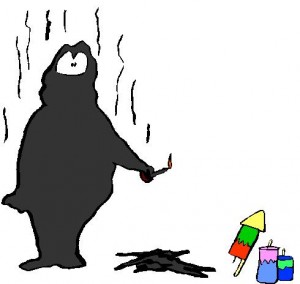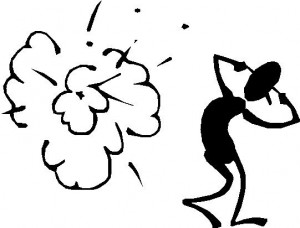 In Part 1, I talked about why we write and why receiving a critique can be so difficult and in Part 2 we discussed what a critique is.
In Part 1, I talked about why we write and why receiving a critique can be so difficult and in Part 2 we discussed what a critique is.
I’ve seen critiques gone bad – so bad that when the author tried to incorporate everyone’s suggestions, he ruined his own story and in another instance, the writer gave up writing for a while. Sometimes it’s hard to find the right group of people or even one person, who understands that observations and comments that help strengthen your work do not need to include wholesale shredding,
So, how to avoid a critique disaster?
What you can do to prepare yourself:
1) The most important thing for you, the author, to remember is that the critique helps you to switch hats – from the creative to the editorial. Remember that creative ALWAYS needs editorial and creative is usually scared to death of editorial. That is why some authors put their stories away for a while before embarking on the editorial journey – to give their creative sides time away from the work so that they can approach the revision and editing process more objectively.
2) Submit your best work and understand what type of critique you are looking for: a reader’s critique, a line by line critique or both? A reader’s critique is one in which the reader tells you what is working and what isn’t, where she was engaged and what threw her out of the story. The points listed at the end of this article can help guide the reader on what to look for. A line by line critique happens when all the other elements of the story are working well and the manuscript is is reviewed for consistency in language, metaphors, grammar, excess wording, etc. Generally, good critiquers will not give you a line by line critique unless they know this is more than a first draft. They can tell that by how strongly your story holds together in terms of plot, consistency, style, character and setting. Only then will they focus on line-by-line edits to polish the story.
2) Understand that some people can’t help but shred, rewrite and go beyond what is asked for. Take what you need and leave the rest but for goodness sake, don’t take it personally! Have confidence in your work and move on. Know that you can’t and don’t have to use everyone’s suggestions.
3) Know you may disagree with someone’s comments but do not take issue or become defensive. Instead become curious as to why they made those comments. Was there a misunderstanding or misinterpretation of some sort? If so, the reason for the comments may need to be addressed. Sometimes a person’s comments may simply be wrong. They may offer bad or unwelcome suggestions or see problems where they don’t exist or miss existing problems. Ultimately, you must choose the feedback that works for you.
4) Understand who is critiquing. Not everyone may be familiar with the nuances of the genre you are writing in or the age level you are targeting and that may pose problems. Short story writers and novelists may have different views on pacing, description, speed of character or plot development. You need to understand the person who is responding to your work to give their comments appropriate context.
5) Above all, be respectful and gracious. This person took time from their other activities to help you.
What you can do to prepare others:
1) Tell them what stage this is in. First draft? Final draft needing polishing before submission? This should include information about the intended market such as Writers of the Future submission, YA novel, adult historical fantasy, etc.
2) Be clear about what you are looking for – first draft I always ask for a reader’s critique. What is working? What keeps you in the story? What isn’t working? What throws you out? Do the character’s actions ring true?
3) It’s good to tell others where you have concerns. For example, 1) I’ve rewritten the beginning several times and am not happy with it. What’s working or not working? Is this the right place to start the story? 2) Does the science make sense? Is the world I’ve created consistent and credible?
Here are some points used by writers and in critique groups that I belong to. Use them to help focus the questions you want answered, or if you’re looking at someone’s work, use them as guidelines of things to look for. Some will use this as a template, while others may only touch upon pertinent points.
General impressions: An overview of what worked and what didn’t; critiquer’s theory of theme, premise & plot summary; first impressions on title, emotional response, stumbles, questions and expectations; if the story is satisfying; and how well does the title work?
Plot:
It the problem clearly stated?
Is there a full story arc?
Does the opening/hook work?
Is there rising action & a climax?
Is the resolution complete?
Did something change?
Are there plot holes?
Does each scene work?
Is there appropriate revelation throughout the story?
Consistency:
Are there places where suspension of disbelief fails?
Is the internal logic consistent?
Does the narrative flow with proper pacing, rhythm?
Is there sufficient conflict (of all types)?
Style:
Is the style of writing appropriate?
Is an appropriate narrative tone used?
Is dialogue stilted or otherwise out-of-place?
Is there a proper balance of narrative and dialogue?
Is there appropriate narrative tension?
Is Point of View consistent? The best choice or mix?
Is tense consistent?
Character:
Sufficiently developed & distinct?
Do they speak with distinct voices?
Do they change?
Do they have believable motivations & behaviors?
Are there too many characters?
Do they have appropriate names?
Do they have strengths & weaknesses?
Are the interesting?
Is at least one character sympathetic?
Setting:
Is it complete or full of holes?
If a character, is it fully developed?
Technique summary:
Are there technical problems? (its vs it’s?)
Remember that the purpose of the critique is to help us polish the gem of our story until it sparkles in its brilliance. So, keep your eye on the prize, have confidence in what you’re doing, revise, polish and above all, submit your work!
